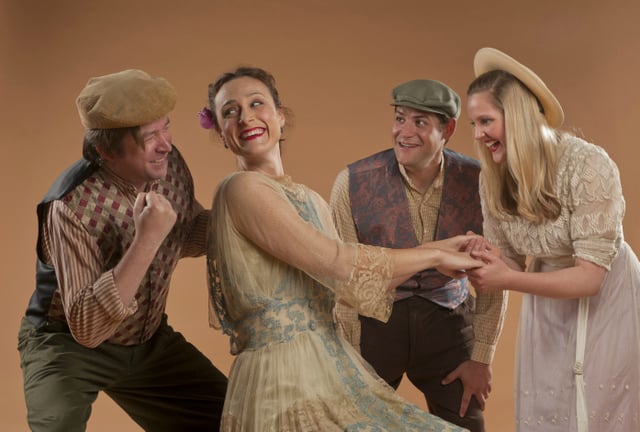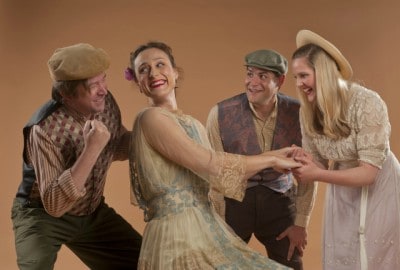Three Sisters
Location: 42nd Street Moon
Directed by: Greg MacKellan
- Music by Jerome Kern
- Lyrics by Oscar Hammerstein II
- Book by Oscar Hammerstein II
- November 30, 2011 thru December 18, 2011
- The Eureka Theatre
There’s something fundamentally wrong with the notion that a stage production that was created during the lifetime of a theatre patron has to be restored and rescued from virtual extinction. But such was the case here.
Three Sisters made its debut in London in 1934 and the reception from the U.K. critics was decidedly mixed. It closed after just two months, never to make it to this side of the Atlantic. It had been the shortest run theretofore seen in the long, illustrious history of the Drury Lane Theatre, and it would be composer Jerome Kern’s last West End show.
It was also Kern’s final joint effort with the brilliant librettist and lyricist Oscar Hammerstein II. That’s a pity, because their collaboration produced a play that should have been given a place among the pantheon of great American musicals. Instead, it sank into oblivion, never to be seen again, although some of its songs have lived on to became quite popular both here and abroad (“I Won’t Dance”).
Fortunately, 42nd Street Moon’s visionary Artistic Director, Greg MacKellan, recognized the artistic merit and importance of this unheralded classic. He discovered, however, that much of the original production materials were feared lost or at best not easily recovered. Working from that which was more readily available, he put together a barebones, concert-reading version and brought it to a U.S. venue for the first time in 1995 (at the New Conservatory Theater in San Francisco).
In 2010, Mr. MacKellan was awarded a grant from the National Endowment of the Arts enabling him to finish what he had begun fifteen years earlier and fully reconstruct the script and score – along with musical director Dave Dobrusky. In the annals of musical theatre, the fruit of their labor is comparable to Howard Carter unearthing King Tut’s tomb. This treasure is most certainly pure gold!
Set in 1914 near the beginning of World War I, the romantic story involves the lives of a trio of lovely and distinctly different young sisters who traverse the English countryside on the county fair circuit with their widowed father, Will Barbour (a solid Michael Patrick Gaffney), a traveling photographer.
“Tiny” Barbour (Kate Paul), the eldest daughter whose impressive physical stature does not quite fit her nickname, has taken on a somewhat maternal role and is very protective of her younger siblings. She’s engaged to a slightly dull but likeably earnest constable, Eustace Titherley (a wonderfully funny Christopher Reber). Their wedding is a certainty, but the naïve, goody two-shoes finds herself uncharacteristically distracted by the charms of George Purvis (an entirely convincing Bill Fahrner), a carnival performer.
Kate Paul is pitch-perfect as the ambivalent fiancé who despite her valiant struggle to maintain a stern demeanor often finds herself inexplicably “singing and dancing” – particularly while in the presence of the “adventurous” Mr. Purvis. Her natural charisma and comic sensibility are simply captivating!
Ms. Paul joins the talented Riley Krull (youngest sibling Mary Barbour) and Danny Cozart (busker and womanizer Gypsy Hood) in a marvelously staged dream sequence (“What’s in the Air Tonight”), one of many memorable scenes and tunes that showcase the uniformly fine singing and acting prowess of the entire cast.
Brittany Danielle paints a vivid portrait of the middle child (Dorrie Barbour) who aspires to be something more but feels ashamed of her “vagabond” roots. She has an opportunity to shine during both her superb vocal rendition of the poignant ballad “Lonely Feet,” and the elegant “Rogers and Astaire” dance sequence (“I Won’t Dance”) beautifully performed with the extraordinarily versatile Michael Kern Cassidy who plays her aristocratic beau (Sir John).
The number is made all the more effective by the fabulous choreography of Lee Ann Payne and Zack Thomas Wilde, the opulent art nouveau costuming of Scarlett Kellum, and the musical accompaniment of Dave Dobrusky (piano), Nick Di Scala (reeds), and David Reffkin (violin).
Indeed, virtually all of the characters are interestingly complex and wonderfully executed by all concerned, and as the plot develops one is inexorably drawn into the personal, emotional journeys of each of these three ladies and the men that enter their lives.
Hammerstein’s book, while tempered with humor and some lingering farcical elements more typical of the period, doesn’t shy away from serious themes and genuine, heartfelt dramatic arcs and turns as each of the relationships are fully realized. He even has enough faith in both the story and the audience to end the first act on an unusually somber note.
Moreover, the sophistication and poetic eloquence of his lyrics accurately reflect the mood and context evident in the narrative. Unlike the frivolous farces of the 1930s, these are the earmarks of the type of program that came to fruition in the 1940s (otherwise known as The Golden Age). It essentially provides, therefore, a unifying link between the two forms – done in exemplary fashion.
As good as the opening act may be, the second is in some ways even better, both in terms of pathos and melodic content, as we see each of the men go off to France to fight the Great War and the women are left behind.
It’s important to note, however, that although one does get a sense of the pain associated with the prolonged separation, Hammerstein does not make any attempt to depict the conflict as anything more than a road show excursion and temporary diversion. Otherwise, some intriguing twists do ensue, and things are ultimately brought to a happy, albeit somewhat truncated, conclusion.
Perhaps this lighter presentation of such a massive, ruinous tragedy was just too soon after the actual events for the average British theatergoer to embrace.
Greg MacKellan and the entire company must be congratulated for reviving an unfairly discarded masterpiece that will undoubtedly receive (finally) the recognition, accolades and large-scale treatment that it so richly deserves. Bravo!
Three Sisters
42nd Street Moon, San Francisco
4.5 out of 5 stars (Right on the Money)
Directed by Greg MacKellan
The Eureka Theatre
November 30, 2011 thru December 18, 2011
Book by Oscar Hammerstein II
Lyrics by Oscar Hammerstein II
Music by Jerome Kern
[Photo: David Allen]





 Three Sisters
Three Sisters